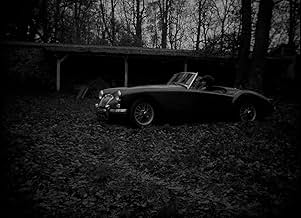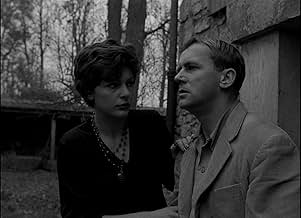Adicionar um enredo no seu idiomaAnne Goupil is a literature student in Paris in 1957. Her elder brother, Pierre, takes her to a friend's party where the guests include Philip Kaufman, an expatriate American escaping McCart... Ler tudoAnne Goupil is a literature student in Paris in 1957. Her elder brother, Pierre, takes her to a friend's party where the guests include Philip Kaufman, an expatriate American escaping McCarthyism, and Gerard Lenz, a theatre director who arrives with the mysterious woman Terry. Th... Ler tudoAnne Goupil is a literature student in Paris in 1957. Her elder brother, Pierre, takes her to a friend's party where the guests include Philip Kaufman, an expatriate American escaping McCarthyism, and Gerard Lenz, a theatre director who arrives with the mysterious woman Terry. The talk at the party is about the apparent suicide of their friend Juan, a Spanish activist... Ler tudo
- Direção
- Roteiristas
- Artistas
- Prêmios
- 1 vitória e 1 indicação no total
- Ida
- (as Louise Roblin)
- Direção
- Roteiristas
- Elenco e equipe completos
- Produção, bilheteria e muito mais no IMDbPro
Avaliações em destaque
Well I'm not a big fan of New Wave (or free-form jazz), so it was rather begrudgingly that I watched this film. Surely enough, it begain in a sort of expressionistic delirium, prompting me to say, "oh great. here we go again. haiku anyone?" But suddenly it reins in, and a very lucid story materializes out of the haze. I was pleasantly surprised. There are many compelling allusions--if not outright parallels--with the classic play "Pericles, Prince of Tyre" as well as Molière and Goethe. This means that the film adopts a certain bit of structure, which is highly unusual for New Wave. I found it very refreshing. With philosophical overtones of Sartre and Camus as well, it's by far the most head-scratching, beard-stroking New Wave film I've seen, and it's not just existentialistic babble either (although there is a hefty share of existentialism).
Its biggest flaw, however, is that it seems to attacks too many themes at once, and in so doing, it dilutes the power it could have had. There's only so much that can be packed into a film, even if it is 140 mins. As a few other reviewers have pointed out, the ideas presented are truncated. Mere fragments. The director intended this, as we see in a dialogue where two characters discuss how the play Pericles is a very fragmented tale which comes together only at the end. HOWEVER, in the case of "Paris nous appartient", it doesn't seem to come together. Whether this was deliberate irony on the director's part or whether it was just poor execution, I can't say. But either way it left me unfulfilled.
It is possible that I missed something. Perhaps I should see it a 2nd time, but unfortunately it falls just shy of the good-enough-to-see-a-2nd-time mark. I did enjoy it, and I'm glad I watched it, but I probably wouldn't care to see it again.
If you see this movie and agree with what I've written, then I think you'll enjoy the film "Orphée" (1950).
Oh, and just a word about the music in this film (since I've already made the analogy of jazz), it's... well... wacky. It's really the equivalent of jazz improv except with symphonic instruments. At times it fits the absurdity of the moment perfectly. But at other times, especially during the dialogue, it can be a bit distracting. I kept wondering to myself how much better it would have been with just a single brooding piano instead of the experimental orchestra noises. But music is entirely a personal taste, so you may enjoy it.
In any case, i liked it a lot. Pace is very good for a 140 minutes French art movie of the 60's. It's interesting, it made me invest and i was curious to see where it goes. Great as a time capsule, Paris was wonderful. Actors are great. This is one of the movies that you should watch a second time for understanding it completely. I won't though. It's good but it is not THAT good. Pace was good as i said but it should have been at least 10-15 minutes shorter. For a 140 minutes movie, it should have been more intriguing to call it a great movie. And the ending was probably clever but i didn't like it, so much for nothing.
But there was some brilliant dialogue here. Way too cynical for its time of course. I think this is a timeless movie, hasn't aged a bit. Less obscure than it seems. If this description made you curious too, watch it, you won't be disappointed.
Jacques Rivette's first feature shows the gelid calm that appeared in most of his movies. with politics and assassination merging in a manner that Hollywood would only tackle in the 1970s.... usually with an air of hysteria. There are a lot of shots around Paris that makes the city a cynical observer of these human goings-on, a subjective camera that views the affair with contempt. I wonder how cameraman Charles Bitsch got that effect.
A sinister undercurent pervades the whole movie: a background plot that is never revealed, or shown directly - it is something that the characters speak to each other about and make reference to. While in other movies the conspiracy plot would have been the central theme, here it is pushed into the background, delegated to a simple object of discussion - the movie instead revolves around the lives of the characters and in particular, the protagonist's, from whose point of view the situation is seen. By bringing the focus onto the characters and their daily lives, illusions and aspirations, the movie manages to to breathe fresh life into what would have otherwise been just another conspiracy film.
A few technical things: The acting is not very consistent. The parisian scenes were very good and the photography was aesthetically pleasing. The music enhanced the atmosphere significantly, though some of its psychedelic overtowns were a bit overpowering at points (making the dialogue hard to follow - if the intention was to transfer the confusion/paranoia to the viewer, it was appropriate, however).
It's not a masterpiece, but it is definitely interesting and worth watching at least once.
Você sabia?
- CuriosidadesAs an inside joke, in Os Incompreendidos (1959) the film Antoine Doinel and his parents go to see is "Paris Belongs to Us", which wouldn't be released for another two years.
- Erros de gravaçãoNear the end, when Pierre is on a public phone at Dupleix, a poster near him reads "DIMANCHE 31 MAI" (Sunday 31 May), advertising a meeting of the Parti Socialiste Unifié. May 31st was a Sunday in 1959, and this scene was filmed in late 1958. However, the film is supposed to be taking place in June 1957, so it makes no sense that a meeting is being advertised nearly 2 years in advance.
- Citações
Anne Goupil: [reading aloud from Shakespeare's The Tempest] Full fathom five thy father lies / Of his bones are coral made / Those are pearls that were his eyes / Nothing of him that doth fade / But doth suffer a sea-change / Into something rich and strange
- Cenas durante ou pós-créditos"Paris belongs to nobody." PEGUY
- ConexõesFeatured in Cinéma, de notre temps: Jacques Rivette le veilleur: 1-Le jour (1990)
Principais escolhas
- How long is Paris Belongs to Us?Fornecido pela Alexa
Detalhes
- Data de lançamento
- País de origem
- Idiomas
- Também conhecido como
- Paris Belongs to Us
- Locações de filme
- Pont des Arts, Paris 6, Paris, França(2 scenes on bridge)
- Empresas de produção
- Consulte mais créditos da empresa na IMDbPro
- Tempo de duração2 horas 21 minutos
- Cor
- Mixagem de som
Contribua para esta página



































